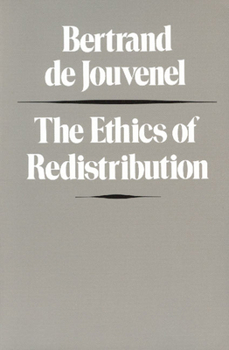The Ethics of Redistribution
Select Format
Select Condition 
Book Overview
In this concise and elegant work, first published in 1952, Bertrand de Jouvenel purposely ignores the economic evidence that redistributional efforts sap incentives and are economically destructive. Rather, he stresses the commonly disregarded ethical arguments showing that redistribution is ethically indefensible for, and practically unworkable in, a complex society. Bertrand de Jouvenel was an author and teacher, first...
Format:Paperback
Language:English
ISBN:0865970858
ISBN13:9780865970854
Release Date:February 1990
Publisher:Liberty Fund
Length:118 Pages
Weight:0.45 lbs.
Dimensions:0.5" x 5.4" x 8.3"
Age Range:18 to 10 years
Grade Range:Postsecondary to Grade 5
Customer Reviews
1 rating
Ethics of Redistribution
Published by Thriftbooks.com User , 15 years ago
Forty years ago Bertrand de Jouvenel gave a series of lectures at Cambridge University which have been published as The Ethics of Redistribution (Cambridge: University Press, 1952; reprint, Indianapolis: LibertyPress, c. 1990). Rather than assess economic or political questions, de Jouvenel asks an essentially moral question: ought wealth be redistributed by political dictate. Since Aristotle, ethicists have recognized the legitimacy of distributive justice, granting certain goods to citizens with bona fide rights, such as life, liberty, and private property. Too frequently, in our century, clear definitions have been sacrificed, and "'just' is whatever is thought emotionally desirable" (p. 18). From earliest days those concerned for justice have focused on the right distribution of natural resources. Calls for agrarian reform, distributing a nation's land so as to enable all men to work and support themselves, have traditionally fallen under the umbrella of "distributive justice." Income redistribution is something else, de Jouvenel argues. Redistributionism, far more than seeking to grant citizens what's due them, seeks to equalize wealth. Land was recognized as a gift of God, thus rightly shared by all. Income, the work of one's hands, comes not from God but from the person. So, in his first lecture, "The Socialist Ideal," de Jouvenel acknowledges "It is now generally regarded as within the proper province of the State, and indeed as one of its major functions, to shift wealth from its richer to its poorer members" (p. 5). The question is: ought such be done? The past two centuries, socialistic thinkers have targeted "private property" as the principal culprit underlying class conflict and injustice. Abolishing private property, Marx et al. said, would lead to the withering away of the state and a utopian paradise. (Ironically, only religious communities seem able to live out the socialist vision. Saints like Francis of Assisi have cheerfully redistributed their wealth out of love for God and their brothers.) Socialists, however, appalled by the anguish of the poor, blamed the rich and sought to rectify the glaring "injustice" through income redistribution. What they found, of course, is that the wealth of the "rich" was insufficient to eliminate the poverty of the poor. So ordinary workers had to be taxed as well as government planners seek to provide everyone "maximal satisfaction." In the process of redistributing the wealth, the State becomes increasingly powerful. Indeed, de Jouvenel notes, in his second lecture, "The more one considers the matter, the clearer it becomes that redistribution is in effect far less a redistribution of free income from the richer to the poorer, as we imagined, than a redistribution of power from the individual to the State" (p. 72). Still more: the voracious State even seeks to assume the financing artistic and cultural activities. "All advocates of ex





